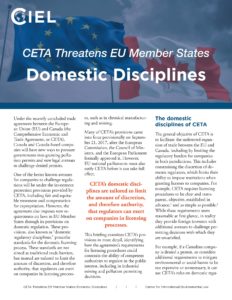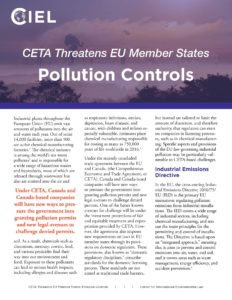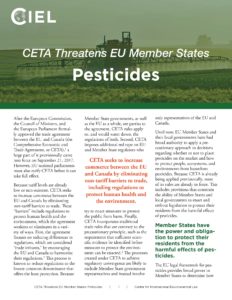The EU-Canada Comprehensive Economic and Trade Agreement (CETA) is designed to facilitate the unfettered expansion of trade between the EU and Canada, including by limiting the regulatory burden for companies in both jurisdictions. This means harmonizing regulations, which historically has meant reducing them to the lowest common denominator; reducing the discretion regulators have to tailor permits to specific technological and environmental conditions; and eliminating precautionary measures by forbidding regulations that are not supported with sufficient scientific evidence.
- Domestic Disciplines: CETA’s Domestic Disciplines Undermine Human Health and Environmental Protections
- Mining: CETA Undermines Greek Mining Regulations and Protections
- Pollution Controls: CETA Enables Challenges to EU Pollution Controls
- Pesticides: CETA Restricts Member States Ability to Protect People from Pesticides
Domestic Disciplines: CETA’s Domestic Disciplines Undermine Human Health and Environmental ProtectionsCETA imposes new requirements on laws in EU Member States through its provisions on domestic regulation. These provisions, also known as “domestic regulatory disciplines,” prescribe standards for the domestic licensing process. These standards are tailored to limit the amount of discretion, and therefore authority, that regulators can exert on companies in licensing process. |
 |
Mining: CETA Undermines Greek Mining Regulations and ProtectionsGlobally, Canada is home to the largest mining companies, which operate throughout the world. Under CETA, Canada-based companies will have new ways to pressure governments into granting mining permits and new legal avenues to challenge denied permits. Given the importance of mining to the Greek economy, this sector is likely to continue growing, and CETA, which Greece has yet to ratify, could have significant national impacts. The Greek mining sector thus provides a compelling case study into how CETA would grant even more avenues for Canada and Canadian companies to challenge EU and Member State permitting decisions. |
 |
Pollution Controls: CETA Enables Challenges to EU Pollution ControlsUnder CETA, Canada and Canada-based companies will have new ways to pressure the government into granting pollution permits and new legal avenues to challenge denied permits. CETA’s domestic disciplines are tailored to limit the amount of discretion, and therefore authority, regulators can exert on companies in licensing processes, such as in chemical manufacturing. Specific aspects and provisions of the EU law governing industrial pollution may be particularly vulnerable to CETA-based challenges. |
 |
Pesticides: CETA Restricts Member States Ability to Protect People from PesticidesCETA drives deregulation of toxic pesticides by promoting the harmonization of regulations, eliminating precautionary measures that are not supported with sufficient scientific evidence, adding additional layers of red tape on their regulatory processes, and excluding Member States from participating in important policy forums. Thus, although Member States have broad discretion and authority to regulate pesticides in a more protective manner than the European Commission, CETA constrains this authority and imposes significant financial risks on Member States that violate CETA’s trade rules.
|
 |
These briefings were made possible with generous support from the European Environmental Health Initiative and the Broad Reach Fund of the Maine Community Foundation.
